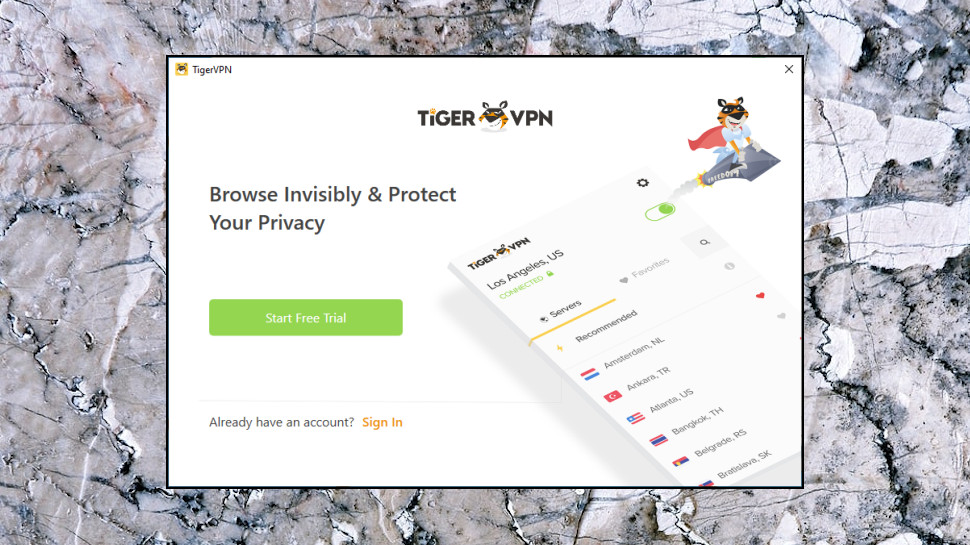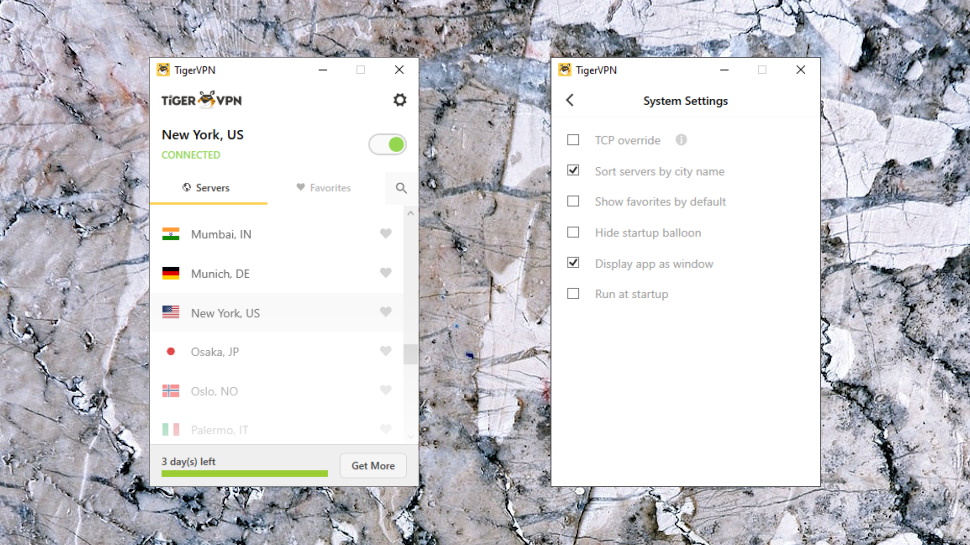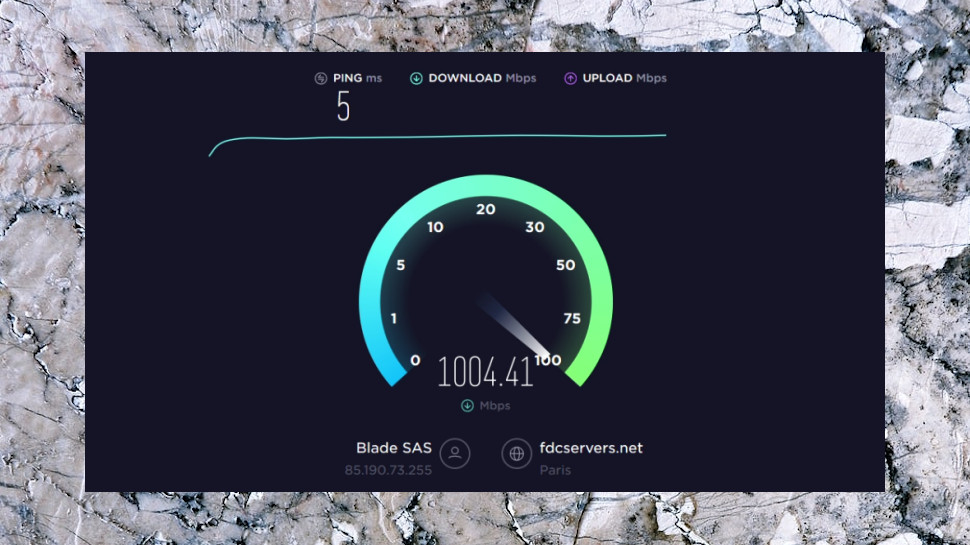TechRadar Verdict
Simplicity is good, but being feature-free is a problem, and TigerVPN doesn't have the power or resources to compete with the top VPNs.
Pros
- +
Easy-to-use desktop and mobile clients
- +
P2P support
- +
OpenVPN underneath
- +
Free three-day trial
Cons
- -
Very few features
- -
No kill switch
- -
No app updates for two years
- -
Doesn't unblock BBC iPlayer, Amazon, Disney+
Why you can trust TechRadar
TigerVPN is an interesting Slovakian-based VPN service with some appealing functions and features.
The company offers 300+ P2P-friendly servers spread across 62 locations in 43 countries, for instance. There are much larger networks around (ExpressVPN, NordVPN, etc.), but TigerVPN says it owns runs its own hardware, DNS servers and infrastructure, coding everything itself.
The company offers native apps for iOS, Android, Windows and Mac, making it easy to get started. And OpenVPN compatibility ensures you can also set up the service with other clients and on other platforms.
- Want to try TigerVPN? Check out the website here
TigerVPN's monthly plan looks expensive at $11.99, especially as you only get support for just two simultaneous connections.
Paying for a year up-front allows five simultaneous connections, though, and sees the cost to fall to a more reasonable (though still above average) $6.67.
A three-year plan clearly gives the best value at $2.75 a month, but there are better deals elsewhere. If you don't like long-term contracts, Private Internet Access' annual plan is a similarly priced $2.85 a month for the first term, $3.33 on renewal. Or if you can live with a two-year plan, Surfshark's is a mere $1.99 a month.

The company doesn't seem to advertise it, but when we downloaded and installed the Windows client, it offered us a free three-day trial. We had to provide our email address and it only allowed us to use a couple of devices simultaneously, but when most providers no longer offer any form of trial, we're not about to complain. Three days testing on your main device is plenty of time to check out the app, speeds, unblocking, and generally getting a good idea of how TigerVPN works for you.
If you do decide to sign up, TigerVPN accepts payment by card, PayPal, Bitcoin and more. A 7-day money-back guarantee gives you some protection, but most providers do better: NordVPN and ExpressVPN offer the industry-standard 30-days, for example, while Hotspot Shield and CyberGhost give you a generous 45-days.

Privacy and logging
Check TigerVPN's feature list and its views on user monitoring seem very clear: 'Protecting our customers is our most important task. Therefore, TigerVPN does not store any activity logs anywhere - period.'
Turn to the small print and it's not quite as straightforward. The company doesn't collect or log the sites you visit or the content of the traffic you upload or download, but it does record some session and other details. Here's the full list, taken from the Privacy Policy:
- VPN protocol and version
- Operating system
- App version
- Traffic statistic
- Randomized country statistics
- Connection session (server location)
- Favorite servers [optional]
- Debug information [optional]
TigerVPN points out that none of this can link you individually to a particular internet action, though, so the significance of this data is limited.
It's unusual to see a VPN store your favorite locations centrally, but there's a good reason for this, as it allows favorites to be synced with all your devices (set a location on your iPhone, say, and it'll be immediately available on your PC.) That's a neat feature which we'd like to see available more often.
Like most small providers, TigerVPN hasn't put itself through any security or privacy audit, so there's no way to confirm that it's living up to its website promises.
Still, the privacy policy goes to great lengths to provide real details on how the service works and what it means for you, and it feels far more trustworthy than the 50-word 'we absolutely definitely 100% don't log anything about you ever' policies pushed by so many competitors.
If this matters for you, don't take our word for it, check out the document for yourself - even 30 seconds skimming through the headings will show you this is a step above the average VPN privacy policy.
Apps
Signing up with TigerVPN was easy. We worked through the usual email-password-payment sequence, and arrived at an excellent web console with app download links, connection information, account details and more.
Installing the Windows client proved just as straightforward, and within a couple of minutes we were looking at its dashboard. This is much like any other VPN app in the world, ever - connection button, list of locations, Favorites pane, Settings box - but it's easy to use, and you'll feel at home right away.
Real-world use works more or less as you'd expect. Double-click a server and it connects; desktop notifications let you know when you're protected, or if the connection drops; you can switch to another server at any time without closing your current connection.
One exception is the client's 'Recommended' feature. We expected this to connect us to our nearest server in the UK, but instead it directed us to France.
Although the client is easy to use, it's also a little basic. While other VPN apps might enable sorting by city name, country, continent, ping time, server load or more, with just a single click on the list, TigerVPN's offering displays only the city name and two-letter country code. The Settings panel has a 'Sort servers by city name' option which is enabled by default, and we wondered if turning this off might get us a list sorted by country, but no-- the client just displayed its locations in an apparently random order.

Browsing the rest of the Settings panel revealed the real problem with the client, as it barely has any of the features we'd usually expect to see. You can't switch protocol (it's OpenVPN-only), or auto-connect when you access insecure networks, for instance. There are no connection tweaks beyond the ability to switch from UDP to TCP, and no sign of a kill switch to protect you if the connection drops.
We tried manually closing the OpenVPN process to see what would happen if the VPN connection were lost. A desktop notification warned us immediately, which was good, but the best this could do was tell us manually to reconnect. A more capable client would at a minimum have an option to automatically reconnect itself, and protect your traffic by blocking internet access until the VPN was restored.
Maybe the Android app would be better, we wondered. For the few seconds it took to install it, anyway.
It looks and feels almost identical to the desktop build, only with even fewer settings. It got us connected, but no more. A poor Play Store rating of 3.3 suggests users aren't too happy, but with the last release dating from May 2018 - which, when we checked, was the same as the last Windows update - they probably shouldn't hold their breath for any imminent improvements.
Netflix
While some VPN providers focus on their privacy benefits, TigerVPN leads on its ability to 'unblock geo restrictions and website filters', which it says allows you to 'kiss censorship and restrictions goodbye and access any website on the planet.'
That sounds great, but it didn't take long to discover that it wasn't true. We tried logging in to TigerVPN's London and Manchester locations, but neither allowed us to access BBC iPlayer, with the site detecting the VPN and warning 'this content is not available in your location.'
The problems continued as we failed Amazon Prime Video and Disney+.
TigerVPN says its US and most other servers are currently blocked by Netflix, but we were surprised to find we could stream US Netflix content via a US TigerVPN location. We triple-checked and it worked each time, but the company saying Netflix is blocked makes us a little nervous. Take the three-day trial, confirm it for yourself before you buy.

Performance
TigerVPN's results in our speed tests got off to a reasonable start, with our nearest UK servers averaging 65Mbps on a 75Mbps connection.
UK-US performance was also very acceptable at 40-50Mbps, and even UK-Australia give us 30-40Mbps.
We switched to a European data center with a connection capable of 500Mbps+, but it made little difference; downloads still averaged 55-70Mbps. Not the best we've seen, but, still, with a lowest recorded speed of 30Mbps, TigerVPN is never less than usable.
TigerVPN performed better in our privacy tests, though, with no DNS or WebRTC leaks of any kind, and we found all our test servers were in their advertised locations.
Final verdict
TigerVPN is easy to use, but the lack of features and recent app updates are a concern, and we're struggling to see why you should choose TigerVPN ahead of the more capable competition.
- We've also highlighted the best VPNs

Mike is a lead security reviewer at Future, where he stress-tests VPNs, antivirus and more to find out which services are sure to keep you safe, and which are best avoided. Mike began his career as a lead software developer in the engineering world, where his creations were used by big-name companies from Rolls Royce to British Nuclear Fuels and British Aerospace. The early PC viruses caught Mike's attention, and he developed an interest in analyzing malware, and learning the low-level technical details of how Windows and network security work under the hood.
